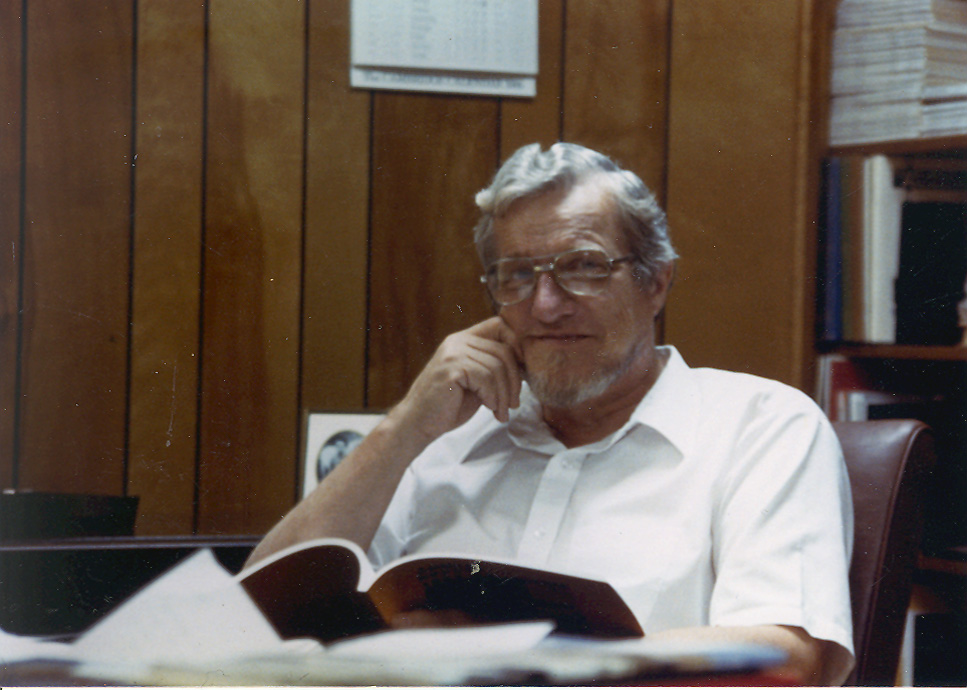FAYETTEVILLE, Ark. – Charles R. “Bob” McGimsey III, founder of the Arkansas Archeological Survey and its first director, died Tuesday, Jan. 20, in Fayetteville. He was 89 years old. A celebration of his life and career will be held from 2-4 p.m. Friday, Feb. 6, in the Convocation Room of Butterfield Trail Village, 1923 E. Joyce Boulevard, Fayetteville. The family encourages friends and colleagues to remember and reminisce about McGimsey as a person and as an archaeologist at the informal gathering.
McGimsey joined the University of Arkansas faculty in 1957 where he taught for 33 years. He helped create the Department of Anthropology and served as its first chair (1969-1972). In addition to teaching, he served as director of the University of Arkansas Museum (1960-1983) and the inaugural director of the Arkansas Archeological Survey (1967-1990).
Under McGimsey, the museum conducted field schools at archaeological sites throughout Arkansas, adding to the collections. He expanded the collections in all areas, with the acquisition of mammal skins and skulls in zoology, representative specimens of the mineral resources of Arkansas in geology, Mexican masks and ceramics in ethnology and textile arts and production in history. The paid staff grew to include an assistant director, a preparator, a museum registrar and three part-time curators.
McGimsey’s legislative activism began in 1959 with the drafting of a bill and successful lobbying to establish a program for archeological research. In 1967, he worked with the Arkansas Archeological Society and several colleagues to expand the 1959 law, resulting in Act 39 of the Arkansas General Assembly creating the Arkansas Archeological Survey. Other legislative victories included laws making it illegal to damage and destroy archeological sites on public lands and establishing the state historic preservation office.
An Arkansan by choice, McGimsey dedicated his book Public Archeology to his fellow citizens: “To the people of Arkansas and their elected representatives, who together have had the foresight and determination to blaze new trails in archeological legislation and public support, and by so doing have provided Arkansas with a potential for the best state program of archeological research, preservation, and development in the country.”
McGimsey’s awards were many, including the Society for American Archaeology’s first Distinguished Service Award (1975) and its Award for Excellence in Cultural Resource Management (1995). In 1989, the Arkansas Archeological Society named its highest award after him to honor those with distinctive records of archeological site preservation. The Register of Professional Archaeologists created the McGimsey-Davis Distinguished Service Award in honor of McGimsey and his long-time colleague Hester A. Davis, who died in December.
He authored two influential publications during the early development of cultural resource management in the United States. He co-wrote Stewards of the Past (1970) with Davis and Carl Chapman. The small pamphlet grew out of concern for massive site destruction from agricultural practice in the Mississippi River Valley. The book Public Archeology (1972) contained McGimsey’s vision for the engagement of professional archaeologists with the general public, encouraging archaeologists to nurture amateur archaeological societies, develop public programs and engage the public to develop state laws.
“Public Archeology tells how the lay public can really contribute to its local archeology in a completely useful, sane, and legal way,” John O. Brew of Southern Methodist University wrote in his review of the book. “In fact, it presents a blueprint for it. It designs a state-supported archeological program including full public participation, and then cites an example in detail, Arkansas, which the author knows best.”
After starting college at Vanderbilt University and military service in World War II, McGimsey earned a Bachelor of Arts in anthropology from the University of New Mexico (1949) and a Master of Arts (1954) and doctorate (1958) in anthropology from Harvard University.
McGimsey was born June 18, 1925, in Dallas, Texas, and spent much of his youth in the New York area. He is survived by his wife, Mary E. McGimsey; three sons, Chip, Brian and Mark McGimsey; six grandchildren, Michael Robert and Maegan Elizabeth McGimsey, and Jack Alexander, Dennis Charles, Forrest Conner and Neil Evan Wold-McGimsey; one sister, Ann Crone; one half-brother, Doug Bethurum; and one daughter-in-law, Joanne Grady. He was preceded in death by his grandson Patrick Thomas McGimsey.
In lieu of flowers, the family requests that contributions be directed to the Charles R. McGimsey Scholarship Fund at the University of Arkansas. The scholarship was endowed by Timothy C. and Christine Klinger to support graduate students in the Department of Anthropology. It further honors McGimsey by giving preference to students who focus on cultural resource management and working with the Arkansas Archeological Survey.
Contacts
George Sabo III, director
Arkansas Archeological Survey
479-575-6375,
Darinda Sharp, director of external affairs and alumni outreach
School of Journalism and Strategic Media
479-595-2563,
